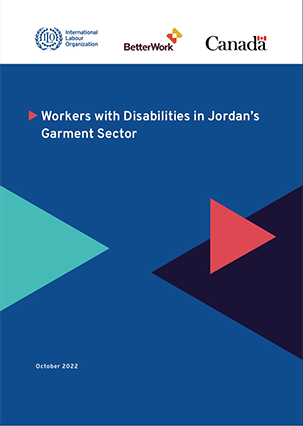You are here
Study highlights challenges faced by workers with disabilities in Jordan’s garment sector
By Mays Ibrahim Mustafa - Dec 22,2022 - Last updated at Dec 22,2022

The cover of the report
AMMAN — A study published by the International Labour Organisation (ILO) highlighted a number of barriers and obstacles faced by persons with disabilities in Jordan’s garment sector.
The study was conducted by the Phenix Centre for Economic and Informatics Studies on behalf of Better Work Jordan (BWJ), a partnership between the ILO and the International Finance Corporation (IFC), which aims to promote better work conditions and boost the competitiveness of Jordan’s garment sector.
The study, titled “Workers with Disabilities in Jordan’s Garment Sector”, focused its evaluation on 12 factories within three industrial zones located in Ad Dulayl, Sahab and Irbid.
It underlined the “pervasiveness of infrastructural inadequacies” in inspected factories, many of which failed to meet basic workplace standards and requirements for persons with disabilities.
In 83 per cent of cases, specialised transportation, dedicated on-site parking or special bathrooms are not available to workers with disabilities, according to the study’s findings.
Other observed infrastructural inadequacies included the absence of any form of textured path or guiding system for visually impaired workers in all inspected factories.
The study also found that “in 75 per cent of cases where stairs were present, no alternate means of access were provided for people in wheelchairs, with access ramps present in only 8.3 per cent of cases”.
Moreover, respondents reported difficulties accessing information related to their rights as workers, according to the study.
For example, “several visually impaired workers remarked that their contracts had neither been provided in Braille nor read out to them in full”, it said.
The study also noted workers’ lack of access to legal aid and training, which was “illustrated by their recounting of several labour rights violations, namely regarding late wage payments and the granting of leave days”.
Additionally, “programmes and workshops provided did not include sign language interpreters or Braille translations of important documents or training material” and “only two of the inspected factories had sign language interpreters present at meetings and conferences”, it added.
The study’s findings also highlighted persons with disabilities’ absence from decision-making and administrative positions, as “only one person with disabilities worked in a supervisory role”.
It further stated that women with disabilities were more vulnerable to workplace discrimination as well as sexual harassment and abuse compared to their male counterparts.
The study stressed that the aforementioned barriers impact persons with disabilities’ social skills, psychological wellbeing and self-perception.
In an interview with The Jordan Times, Hamada Abu Nijmeh, a Jordanian expert in labour affairs, said that the lack of accessible infrastructures and facilities at workplaces is among the main hindrances to persons with disabilities’ employment.
He also stressed the need for “more inclusive vocational training programmes that cover a wider variety of jobs”.
Additionally, Abu Nijmeh said that prevailing negative stereotypes, which perpetuate a lack of trust in persons with disabilities’ capabilities, often leads employers to assign workers with disabilities to jobs that don’t align with their abilities or desires, an issue that was also pointed out by respondents in the study.
Anas Shtiwi, a gender and social inclusion adviser, also stressed the importance of a more inclusive educational system to enhance the employment prospects of persons with disabilities.
Moreover, “it is essential to continuously review plans and legislations related to enhancing persons with disabilities’ access to employment opportunities and to ensure that they’re translated into practice,” he told The Jordan Times, stressing the importance of enhancing the Ministry of Labour’s supervisory capacity.
The study pointed out that around 72.2 per cent of persons with disabilities in Jordan were not employed, according to a 2015 census by Jordanian Department of Statistics, which also shows that 22.3 per cent of persons with disabilities in Jordan had never received any form of formal education and 21.4 per cent were illiterate.
Its recommendations included strengthening cooperation between stakeholders at all levels, investing in training programmes to promote the employment of persons with disabilities and increasing their access to information in addition to ensuring the compliance of work environments with international standards and enhancing efforts to address issues like wage discrimination and inflexible work schedules.
Related Articles
AMMAN — The Jordanian Masarat Foundation for Development and Innovation launched a study on Wednesday titled "Industry as a Means of Inclusi
AMMAN — The Labour Ministry is working with its partners to create 4,000 job opportunities for women in remote areas and governorates, Labou
AMMAN — Celebrating International Women’s Day, HRH Princess Basma on Friday visited a garment factory in Ajloun that employs 382 women and 1












